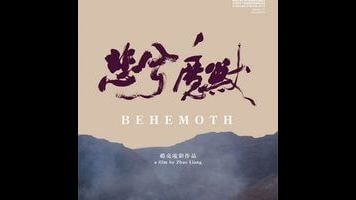Behemoth finds poetry in China’s industrial badlands

In Behemoth, the Chinese documentary filmmaker Zhao Liang takes on the industrialization of Inner Mongolia lyrically, crafting a nearly wordless visual poem of imploded landscapes and sick, tired workers. His subjects are death and heaven; The Divine Comedy gets name-checked (and even credited as source material), while the English title smacks of Paradise Lost. Of course, it’s impossible to make an apolitical documentary about China. Zhao breaks his into two dark, dirty sections—the first about coal, the second about steel—and concludes with an epilogue, in which the camera emerges ominously from a traffic tunnel into the eerie streets of a ghost city, where rows of sulfur-yellow high-rises stand empty and spotless in the daylight. As for any explanatory titles or statistics, they come only at the end. The filmmaker, who has been a part of the vanguard of Chinese nonfiction film since the early 2000s, has distilled his vérité style into a vision of the post-apocalyptic landscape, the infernal pit, and the spotless paradise of new construction where no one goes. His camera no longer suggests a fly on the wall.
The problem with Behemoth is paradoxical: as a documentarian, Zhao is a poet, but as a poet, he’s an amateur. He draws scattered pieces of narration about ghosts and ascension and staged symbolic sequences involving mirrors and nude figures into the movie, which come across as unnecessary and pretentious. More importantly, they break the spell of the real poetry that comes from filming and showing. Zhao, who acts as his own cinematographer, has a great eye for scale and contrast, and the less Behemoth points out its symbolism, the more potent it becomes. The opening scene surveys a pit mine as the ground erupts with blast charges, the landscape seemingly in revolt; the climax is a 10-minute sequence that follows a day’s work in a steel mill, deafened by high-pitched metallic whistles and clangs that sound like a chorus of the damned. There is a lengthy descent down into a coal mine, by elevator, cart, and finally on foot, with each level murkier and more hellish that the last.
There are also signs of the fragility of life at the front lines of industrialization: dingy bunk beds; yurts set up on the verdant (but disappearing) plain; migrants with black lung, holding up a protest banner with their oxygen tanks slung over their shoulders. Zhao is not above a certain obviousness, but neither is reality; in the ghost city, completed but almost unpopulated, he catches a bored sanitation worker as he chases a tumbleweed across a four-lane street that looks like it’s never seen a car. His earlier films delved into the lives of policemen on the North Korean border (Crime And Punishment) and litigants forced to live in a Beijing shantytown (Petition); they tackled the scope of social dysfunction in China as though it were a sprawling novel. Here, he forgoes any sense of identification, attempting to get the level of myth, casting the destruction of the landscape and the exploitation of the workers—who return blackened at the end of every shift, until they end up wheezing in a bed with a nasal cannula looped over their ears—as a cycle of elemental forces. It could stand to be more fluid, but it leaves a heck of an impression.